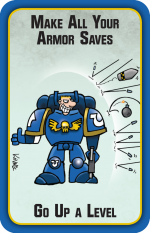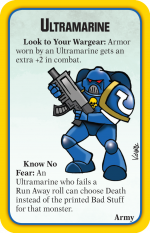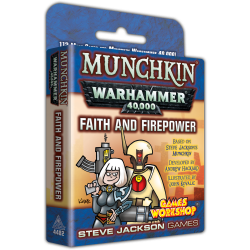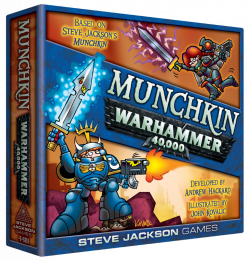Design Diary: Submitted for Your Approval...
Andrew Hackard
December 26, 2018
With most Munchkin games, the development process is entirely internal, ending when all the art is in and we have our premortem. After we make the last few changes, we send the game to print. Easy!
When the game is based on a license, as with Munchkin Warhammer 40,000, the process is different and involves a lot of consultation with the licensor to make sure we're all moving in the same direction. Generally, we're in touch often enough that if we do start to go off the rails, we can correct course without involving a lot of wasted time and work that has to be redone. It's a true wild card; a licensor who has very stringent ideas about things could cause a lot of back-and-forth while we try to hit a very narrow target.
(A quick bit of terminology: The licensor is the party with creative control and ownership of a property. The licensee is the person or company who has been granted a right to create something using that licensed property. For Munchkin Warhammer 40,000, Games Workshop is the licensor of the Warhammer 40,000 game and setting, and Steve Jackson Games is the licensee. If Games Workshop were creating and publishing the game, those roles would be reversed, as they would have licensed Munchkin from us. We have licensed in both directions – sometimes on the same license! – and every deal is different, so nothing about this article should be considered "the one true way.")
Workshopping the Game
Fortunately for me, for Steve Jackson Games, and for all of you, Games Workshop has been an outstanding licensor. From the beginning, they have been a true partner on Munchkin Warhammer 40,000, sending me both digital and hardcopy references to bring me up to speed quickly. When I've had a question (which was a LOT, especially in the beginning), they've been fantastic about getting me an answer as soon as they can, and they haven't been afraid to make suggestions where they were appropriate – many of which got adopted into the game.
 An important question at the start of any licensed project is how much freedom we have to play around. Munchkin works best when we're able to tell the kind of jokes that acknowledge some of the silly things about the games and genres we love while also reminding us why we love them. It's a tricky balance to strike, making sure fans know that we're laughing with them, not at them. Games Workshop gets it. They've been very open to letting us have some fun with the Warhammer 40,000 setting and poking some gentle fun at its players – "breaking the fourth wall," to borrow a theater term. One of the reasons to write a licensed Munchkin game is to put in jokes that wouldn't work nearly as well – or at all – in any other setting, and we were lucky to have Games Workshop's support and ideas in doing that.
An important question at the start of any licensed project is how much freedom we have to play around. Munchkin works best when we're able to tell the kind of jokes that acknowledge some of the silly things about the games and genres we love while also reminding us why we love them. It's a tricky balance to strike, making sure fans know that we're laughing with them, not at them. Games Workshop gets it. They've been very open to letting us have some fun with the Warhammer 40,000 setting and poking some gentle fun at its players – "breaking the fourth wall," to borrow a theater term. One of the reasons to write a licensed Munchkin game is to put in jokes that wouldn't work nearly as well – or at all – in any other setting, and we were lucky to have Games Workshop's support and ideas in doing that.
Approval-Seeking Behavior
As I worked on Munchkin Warhammer 40,000, there were several stages at which I stopped to talk to our colleagues at Games Workshop. It let me make sure I wasn't veering off course and made sure they knew that progress was being made. The first check-in was over the Classes and Races I picked for the set . . . and if you're thinking, Wait, I thought this game had Armies, not Classes and Races, now you know why approval checks are so important. My idea wasn't going to be workable within the Warhammer 40,000 setting. Getting that check done right at the start saved me a LOT of wasted time and effort and steered me toward the six Armies we ended up with, which is more in keeping with the original game and gives Munchkin Warhammer 40,000 its own identity in the Munchkin universe.
 The next time I submitted something for approval was when I was finished with the first draft of the cards and art specs (the notes to the artist about what to draw for each card). They had been through internal approvals (i.e., Steve) and now I needed Games Workshop's thoughts. This was nerve-wracking – what if they hated what I'd done? what if they hated me? – but it turned out not to be a problem at all. Sure, there were corrections that needed to be made, and a few cards that just didn't work, but that's expected when you're playing in someone else's sandbox, and really the changes were minor and easily accomplished.
The next time I submitted something for approval was when I was finished with the first draft of the cards and art specs (the notes to the artist about what to draw for each card). They had been through internal approvals (i.e., Steve) and now I needed Games Workshop's thoughts. This was nerve-wracking – what if they hated what I'd done? what if they hated me? – but it turned out not to be a problem at all. Sure, there were corrections that needed to be made, and a few cards that just didn't work, but that's expected when you're playing in someone else's sandbox, and really the changes were minor and easily accomplished.
Having gotten everything approved in first draft, I started playtesting the cards while John started working on the art. As the initial line art came in and Steve and I okayed it, we submitted batches to Michael and Christian at Games Workshop. As with the rest of the project, this went as smoothly as I'd hoped – there were some changes requested to the art, but by and large they were thrilled with the illustrations and that kept John working at a nice pace to get the project done on time. It's always nice when other people see the same whimsy and fun in John's art that we do!
The Last Step
 When the game was complete and we had finished our premortem, we submitted the whole package – rules, gameboard, standies, cards, box, shipping carton – to Games Workshop for final approvals. We had a bit of back and forth about the legal language – the fine print that sane people never read but that protects the rights of all parties involved – but that was quickly resolved. It was a smooth and easy approval all around, and we got Munchkin Warhammer 40,000 to print right when we wanted to. It doesn't always go that way, so it's great when it does.
When the game was complete and we had finished our premortem, we submitted the whole package – rules, gameboard, standies, cards, box, shipping carton – to Games Workshop for final approvals. We had a bit of back and forth about the legal language – the fine print that sane people never read but that protects the rights of all parties involved – but that was quickly resolved. It was a smooth and easy approval all around, and we got Munchkin Warhammer 40,000 to print right when we wanted to. It doesn't always go that way, so it's great when it does.
Let me add special thanks to Alain Dawson, who handled most of the communications between Steve Jackson Games and Games Workshop, making sure information funneled both directions as needed and keeping track of the outstanding issues, which let both sides focus on what they did best. This process would not have been nearly as smooth without her help.
We didn't have a lot of time to enjoy the moment, however, because while Games Workshop was giving us the final approval on the core game, we were deep into Faith and Firepower, including its own batch of approvals. We'll talk more about that expansion in 2019!

